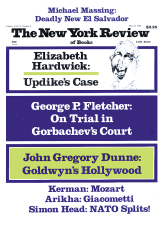The following is drawn from a recent essay by Bohumil Hrabal. It was written shortly after the demonstrations in Prague this January held to commemorate the death of Jan Palach, who had immolated himself in January 1968 to protest the invasion of Soviet troops and the overthrow of the Dubcek regime. Dozens of people who took part in the recent demonstrations were arrested by the police and many are still in jail.
…What has actually taken place in this city during the last two days? The armed power of the police and the militia crudely intervened in the affairs of young people who had created a myth of their saint [Jan Palach], and I believe it was those same armed police who claimed for themselves the right to overstep the bounds of “reasonable” force in dealing with people who had neither firearms, nor stones, nor sticks, and who were armed only with words and whistles, who were pushing baby carriages…. What had really changed? Sooner or later tears clear the eyes, an eye lotion takes care of tear gas, clothes dry or one buys new ones, people arrested will eventually be released, life will return to its old ways…. Do you really believe that, Mr. Hrabal? No sir! Those young people who took part, either actually or in spirit, have already performed an act of commitment, of solidarity, of saying yes to a certain Good, of making a pledge that will be redeemable in the future….
I walked down deserted Parizska Avenue. A police car quietly pulled up at the curb, a man got out and began quietly placing parking tickets on the windshields of illegally parked cars, then quietly the headlights turned toward Maison Oppelt, from the fifth floor of which Franz Kafka once wanted to jump, and then I stood all alone in the square. The place was deserted. I sat down on a bench and began to reflect…. In front of me loomed the monument to Master Jan Hus. When he was being burned at the stake an old woman brought some dry sticks so that the Master could burn more easily. The monument stood in the darkness in the middle of the square whereas the Kinsky Palace and its walls and the whole eastern side of the square was aglow, illuminated by sharp sodium lights in such a way as to make the black silhouette of the monument stand out against the pink and tan walls of the palaces and houses, and as I sat by myself a youngster climbed up on the seat and began jumping from one bench to another. Suddenly the soft voice of a flute sounded from the heart of Old Town Square as if floating from a far-off meadow or a lonely lake, the voice of the flute was moving in itself and also because just a few hours earlier the last cars had left this square with their tear gas and their water cannons and their German shepherds, those lovely German sheep dogs that were by now probably back in their kennels resting after that strenuous Sunday and Monday…but here, in Old Town Square, the voice of the flute sounded so clear from the heart of the monument that it frightened me. I got up, cupped my ears, turned my head….
Yes, now the voice of the flute grew louder, it radiated over the square and seemed to be coming from the circle of shrubs surrounding the statue of Master Jan Hus, and rose from those evergreen conifers. Several passers-by crossed the square, their voices resounding through the emptiness, but nobody stopped. Then a series of steps proceeded on a diagonal from Zelezna Street to Parizska Street, from Dlouha Street to Melantrichova, and then the voice of the flute stopped. The silence seemed close to bursting like an overstretched string on a violin, and I saw the branches of one of the shrubs at the foot of the monument spread apart and someone leaped out onto the pavement, which shone with the reflected light of the illuminated walls, and then I saw a second figure separate itself from the gloom of the monument. It was a woman with a baby carriage, and now a young woman and a young man stepped out of the shadows and into the sharply lit area next to the former Unicorn Pharmacy. They were pushing the carriage, which perhaps contained the magic flute, and I, because I am a literary man, glanced at the first-floor window of the pharmacy and I recalled that this used to be the salon of Madame Berta Fanta, a salon in which in the old Austrian era Franz Kafka, Albert Einstein, Rudolf Steiner, Max Brod, and Polish poets used to take part in conversations…and when I sat down again I realized that the magic flute had sounded precisely from the highest region from which tidings unfold…. I believe that the rule over Thy things will return once again to Thy Hands….
Advertisement
—translated by Peter Kussi
This Issue
May 18, 1989



